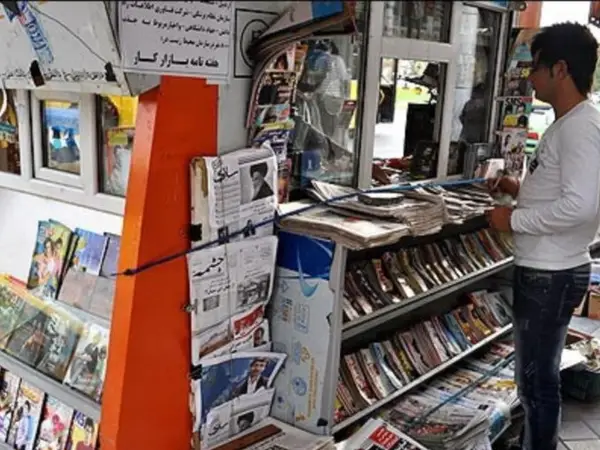A hardliner newspaper in Iran has accused Tehran's ‘reformist’ media of carrying out psychological warfare designed by the "enemy", meaning the United States.
Usually when Kayhan Daily attacks an individual or entity it signals a policy or attitude by hardliners. The paper is linked to and supported by the office of Supreme Leader Ali Khamenei. Its front-page story on Wednesday, August 4, accusing the ‘reformists’ who are loyal to the Islamic Republic, can be a signal of an impending campaign by hardliner followers of Khamenei.
The Kayhan has gone farther, charging that reformist media outlets publish lies and censor positive news daily to instil despair in society and suggest that Iran is entangled in a deadlock and that there is a wide rift between the nation and the government.
The accusation is characteristic of Kayhan's behavior in fabricating incriminating cases against intellectuals, journalists and political activists.
The paper claimed that the Cato Institute, a libertarian think tank in Washington DC has suggested to the US government "to exert psychological pressure on the people of Iran and use the accumulated anxiety and anger among Iranians to instil hatred toward the government, while “beautifying” its enemies.
Kayhan charged that reformist media in Iran constantly portray ordinary problems as crises to accomplish that objective and further Cato's agenda to reinforce the West's “minions” and collaborators. The effort, said Kayhan, is aimed at discrediting the government, erode the people's trust, having the idea of a regime change on its agenda.
Kayhan presented no evidence to support its wild accusations and it was not clear why it singled out the Cato Institute or how the US government could influence government-controlled media in Iran.
Like similar cases in the past, the Kayhan quoted Khamenei’s past warnings about a media onslaught on the Islamic Republic. In this way Kayhan accused the reformist media and journalists of working against Khamenei's will as accomplices of the United States.
The Kayhan said that Shargh newspaper's coverage of recent flash floods in Iran was an example of the kind of articles that have a destructive role. Shargh had written mostly objective reports about lack of government warnings about the impending floods and lack of preparedness to deal with its aftermath.
The Kayhan also mentioned another report in the same newspaper last year about child marriage in Iran and characterized it as portraying a disparaging image of the country.
Kayhan made the same accusation about a similar report in Ebtekar newspaper and went on to quote a report in Etemad newspaper about the suicide attempts by 8 desperate workers, calling it mud-slinging against the government.
The hardliner daily also accused Iran's reformist press of featuring articles by Iranian expat journalists and criticized them for interviewing former deputy chief of the Iranian Environmental Agency Kaveh Madani, charging him as always of being a fugitive spy, while Madani has never been officially charged with any offense.
The Kayhan also accused the Jomhouri Eslami, a newspaper founded by Khamenei in 1979, of spreading lies by writing about drought in Iran quoting Madani, who happens to be an expert on water resources.
Meanwhile, the Kayhan claimed that some reformist journalists work for foreign-based media from Iran and get paid in dollars. Although some of these accusations are hard to prove, or in fact do not constitute an offense under Iranian laws, the hardliner Judiciary can use Kayhan’s claims to prosecute journalists in the future.
The Kayhan quoted Khamenei as saying in a meeting with Judiciary officials in June: "Some people tell a lie, or they spread a rumor… One of the duties of the Judiciary is to deal with these instances…If you do not have a law [for a certain situation], quickly make a law."
